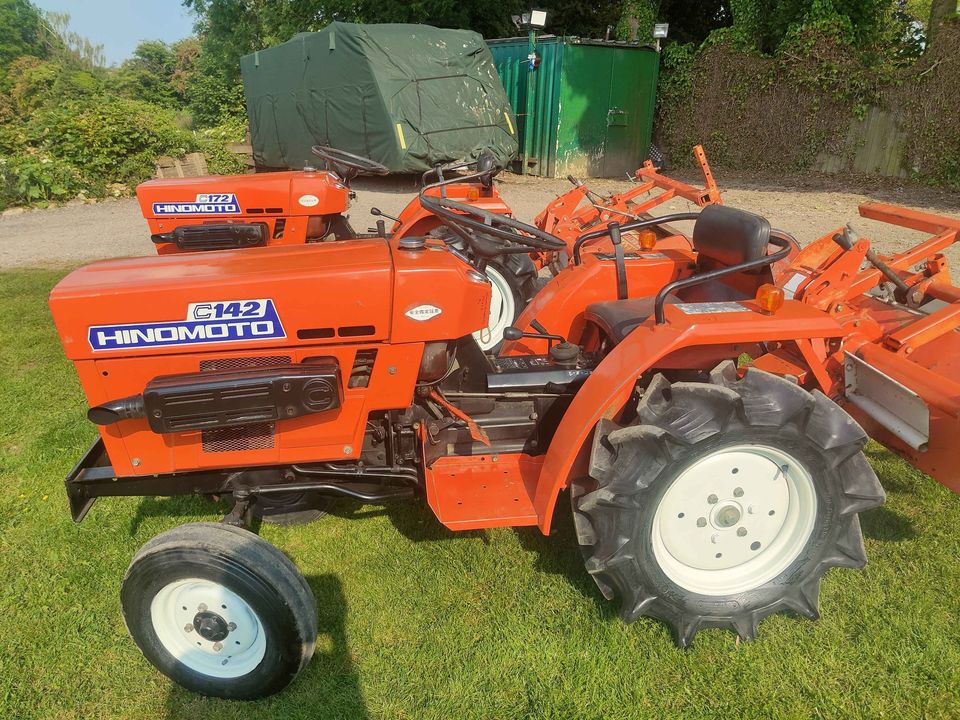The Hinomoto C142 is a compact tractor model produced by the Japanese manufacturer Hinomoto. This small tractor is designed for versatility and ease of use, making it particularly suitable for small farms, landscaping, and grounds maintenance. With its compact size and lightweight build, the C142 is highly maneuverable, allowing it to navigate tight spaces with ease. The tractor is powered by a water-cooled, 4-stroke diesel engine, delivering a reliable 14 horsepower and a torque of 42 Nm. Its synchromesh manual gearbox offers six forward and two reverse gears, and the standard differential lock provides added traction when needed. The tractor’s independent power take-off (PTO) system, hydraulics, and oil-immersed multi-disc brakes contribute to its functionality and utility. With its simple yet robust design, the Hinomoto C142 has earned a reputation for reliability and durability, making it a popular choice for a variety of tasks, including mowing, tilling, and plowing.
| Hinomoto C142 Specs |
|---|
| Production Years | 1980 – 1985 |
| Series | Concord Series |
| Type | Compact Utility tractor |
| ENGINE |
|---|
| Type | Water-cooled, 4-stroke diesel engine |
| Model | Hinomoto N3AD |
| Engine displacement | 1.199 liters (73 cubic inches) |
| Number of cylinders | 3 |
| Rated engine power | 14 horsepower (10.3 kW) at 2,500 rpm |
| Maximum torque | 42 Nm (31 lb-ft) at 1,400 rpm |
| TRANSMISSION |
|---|
| Type | Synchromesh manual gearbox |
| Number of gears | 6 forward and 2 reverse |
| Clutch | Dry, single plate |
| Differential lock | Standard |
| PTO |
|---|
| Type | Independent, 6-spline shaft |
| PTO power | 11 horsepower (8.2 kW) |
| PTO speed | 540 rpm |
| HYDRAULICS |
|---|
| Type | Open center, full live hydraulic system |
| Pump capacity | 10.7 l/min (2.8 US gal/min) |
| Control valve | Single spool |
| Lift capacity | 550 kg (1,210 lb) at lower link ends |
| BRAKES |
|---|
| Type | Oil-immersed multi-disc brake |
| Parking brake | Hand lever operated |
| STEERING |
|---|
| Type | Manual steering |
| Turning radius | 2.2 m (7.2 ft) |
| TIRES |
|---|
| Front | 5.0-12 |
| Rear | 8.3-20 |
| DIMENSIONS |
|---|
| Overall length | 2,670 mm (105.1 in) |
| Overall width | 1,175 mm (46.3 in) |
| Overall height | 1,400 mm (55.1 in) |
| Wheelbase | 1,630 mm (64.2 in) |
| Ground clearance | 245 mm (9.6 in) |
| Operating weight | 735 kg (1,620 lb) |
Advantages:
Versatility: The Concord Series compact utility tractors were versatile machines capable of handling a wide range of tasks on small farms and utility applications. They could be equipped with various attachments such as loaders, mowers, and plows, making them adaptable to different needs.
Maneuverability: These tractors were designed to be compact and easy to maneuver, allowing operators to work efficiently in tight spaces or around obstacles.
Durability: Concord Series tractors were known for their robust construction and durability, making them reliable machines for long-term use.
Ease of Use: These tractors typically featured user-friendly controls and a comfortable operator environment, making them accessible for operators with varying levels of experience.
Attachment Compatibility: The Concord Series tractors often had a range of compatible attachments and implements available, allowing owners to customize their machines for specific tasks.
Comparison with Similar Models:v
When comparing the Concord Series with similar models from other manufacturers during the same era, the choice often came down to specific requirements and preferences. Each brand had its strengths and weaknesses, and the decision depended on factors like the intended applications, budget constraints, and brand loyalty.
Competing models from manufacturers such as Kubota, Ford, and Massey Ferguson offered their own compact utility tractors with varying features and capabilities. The choice between these brands often came down to individual needs and brand preferences.
In summary, the Concord Series Compact Utility tractors from 1980 to 1985 offered versatility and durability for a range of tasks, with advantages in maneuverability and attachment compatibility. However, their limited power and payload capacity were disadvantages when compared to larger tractors. The choice between the Concord Series and other similar models depended on specific requirements and brand preferences.
